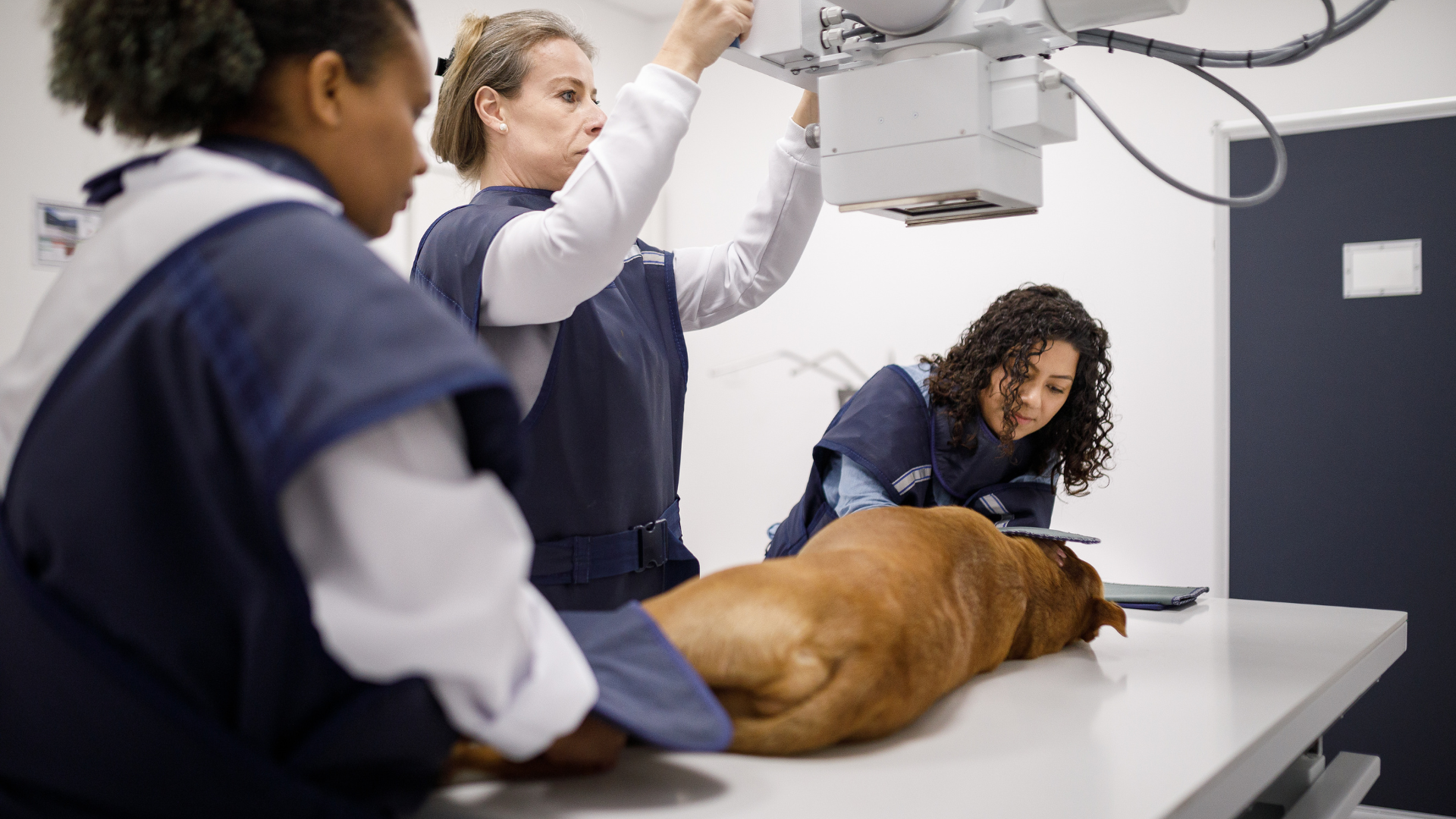
If your precious family member has been diagnosed with dilated cardiomyopathy in dogs, you might feel worried about what it means for them. I’ve been a vet for eight years and dealt with my fair share of heartbreak and questions.
Dilated cardiomyopathy in dogs is common – in some breeds, as many as half of male dogs might be diagnosed. In the general population, it’s nearer one in 200 dogs, but that still means plenty of pets will get a diagnosis of dilated cardiomyopathy (aka DCM) this year.
In this article, I’ll go over all the major questions you’re likely to have about DCM so you can have easy access to the facts about this heart condition.
What is dilated cardiomyopathy in dogs?
Dilated cardiomyopathy in dogs is a heart disease where the heart becomes enlarged but less effective. First, the muscular walls of the heart become thinner and weaker. Then, blood builds up in the heart as they’re pumping less effectively. This blood build-up stretches the heart, causing it to enlarge, which can then cause problems with the heart’s electrical signals or the one-way valves in the heart.
Dilated cardiomyopathy is commonly called DCM for short, and it’s the second most common heart condition in dogs (after mitral valve disease). It’s thought to affect about one in 150 dogs but is much more common in certain breeds.
What causes dilated cardiomyopathy in dogs?
Dilated cardiomyopathy is mostly an inherited condition, appearing commonly in certain breeds and lines. One study found that purebred dogs were more than three times more likely to get DCM than mixed-breed dogs, with doberman pinschers, golden retrievers, boxers, great danes, Irish wolfhounds, weimeraners, and American cocker spaniels more commonly affected.
But canine dilated cardiomyopathy can also have other, non-genetic causes. It can be related to hypothyroidism, a chronically-fast heart rate, and infections of the heart muscle. DCM can also be diet-related, where it’s caused by nutrient deficiencies.

A few years ago, the FDA released a warning that they were investigating a link between grain-free dog foods and DCM. There seemed to be a rise in cases of non-genetically predisposed dogs getting dilated cardiomyopathy, some of which then got better when switched away from a grain-free/high-legume diet.
Despite some interesting small-scale and in-vitro studies, no link has yet been found, with the FDA planning not to add further updates unless things change. It’s a thorny issue, but in summary – we don’t know if grain-free/high-legume diets do cause DCM, or why this would be the case. That said, if your dog is a breed prone to DCM it would be worth bearing this in mind when choosing their diet.
What are the symptoms of dilated cardiomyopathy in dogs?
Scarily, dilated cardiomyopathy in dogs often has no symptoms until it has progressed very far. Sadly, sudden death is sometimes the first time pet parents realize their dog has a problem. This is because what symptoms there are can be very subtle, and it doesn’t always produce a heart murmur for vets to pick up during a clinical exam.
When there are symptoms of DCM in dogs, you might see:
- A fast breathing rate at rest
- Lethargy, or unwillingness to exercise or play
- Change in attitude and behavior – quiet or aggressive
- Restless sleeping, struggling to get into a comfortable breathing position
- Dog losing weight
- Swollen belly (caused by fluid buildup)
- Coughing
- Collapse and fainting
- Sudden death

If you see the symptoms listed above, you should take your dog to the vet for a diagnosis. The symptoms of DCM are vague and overlap with several other conditions, but a vet is the best person to help you determine what’s wrong with your pet.
Because dilated cardiomyopathy can have no symptoms, it’s a good idea to get your dog screened regularly if they’re a prone breed, especially if you plan to breed from them.
How is dilated cardiomyopathy in dogs diagnosed?
Once at the vet’s, they’ll diagnose dilated cardiomyopathy in your dog with the following steps:
1. Clinical exam
The first step is a clinical exam, especially the auscultation of the lungs and heart. DCM doesn’t always cause a heart murmur, so this step might be negative, but it’s still an important check.
2. Blood tests
Blood tests are important to check heart biomarkers as well as the health of other organs. Your vet will take a small amount of blood from your pet’s neck, arm, or leg veins, which is then tested in the lab.
3. Echocardiogram
An ‘echo’ or heart ultrasound is the most important step for diagnosing DCM, as it allows the vet to visualize your dog’s heart and exactly what is going on. Not all vets can perform an echo, so you may be sent to a cardiologist or a sonographer for the exam. In most cases, your dog can be conscious for this exam.
4. X-rays
Sometimes x-rays (properly called radiographs) are needed as well to help vets visualize your dog’s heart size and shape, as well as any congestion in their lungs caused by their failing heart.
5. Electrocardiogram (ECG)
An ECG can be helpful, as it can identify abnormal heart electrical activity. If your vet doesn’t see any problems in-house, they might order a 24-hour ECG through a jacket your dog wears, enabling them to see very occasional problems with the heart.

Treatment for dilated cardiomyopathy in dogs
Unfortunately, there are no treatments that can reverse dilated cardiomyopathy in dogs. However, some medications can help the heart to pump more effectively and reduce the symptoms of congestive heart failure. Common treatments for DCM in dogs include:
1. Pimobendan tablets
Pimobendan tablets help the heart to pump more effectively and are fairly safe.
2. ACE inhibitors (benazepril, enalapril etc)
ACE inhibitors reduce blood pressure by widening blood vessels, which makes it easier for the heart to pump.
3. Diuretics (furosemide, spironolactone etc)
When congestive heart failure starts, diuretics encourage the kidneys to get rid of excess fluid, reducing the blood pressure and the amount of fluid build-up in the chest.
4. Anti-arrhythmics
Anti-arrhythmic drugs are used to help heart electrical activity happen properly. Common types include atenolol and diltiazem.
Remember, the above treatments need prescribing by a vet and can be dangerous, so don’t change doses or stop medication without discussing it with them. Over time, it’s likely the doses of these medications will need to change to take into account your dog’s deteriorating heart condition, so it’s important to monitor them closely at home and return to your vet often if your dog has been diagnosed with dilated cardiomyopathy.
Dilated cardiomyopathy in dogs is the second most common heart disease in dogs, and is the most common in some breeds of dogs. It’s mostly inherited, but there are some other causes, including other diseases and even nutritional deficiencies. Unfortunately, once a dog has DCM it’s difficult or impossible to reverse the damage to their heart, especially as there can be no symptoms until the condition is severe. Treatment can help to reduce symptoms and slow the progression of heart disease, but it’s important to work closely with your vet.
You might also want to read: 32 common dog diseases.




.jpg?w=600)


